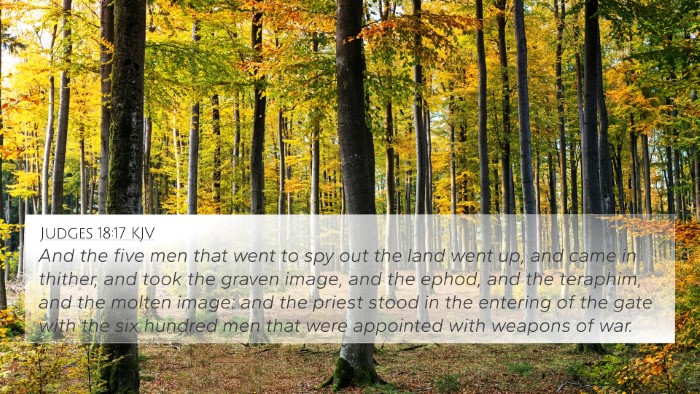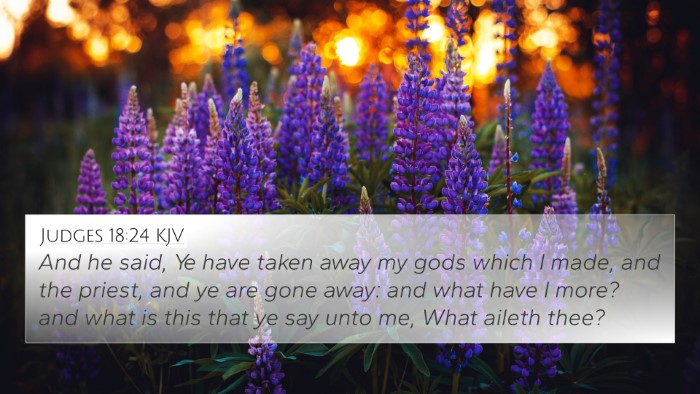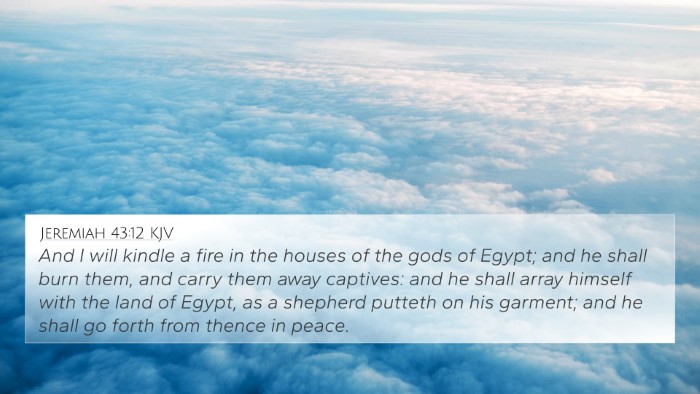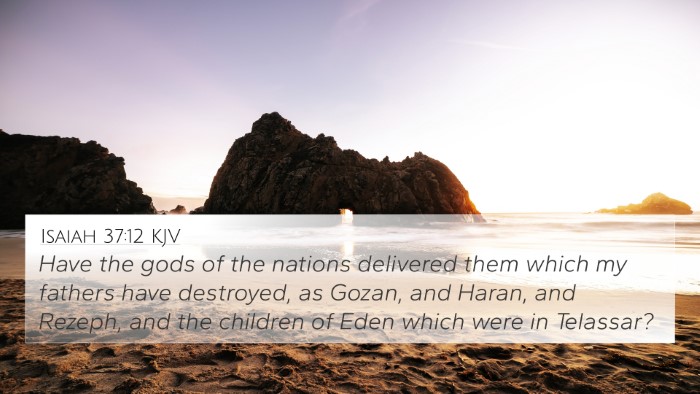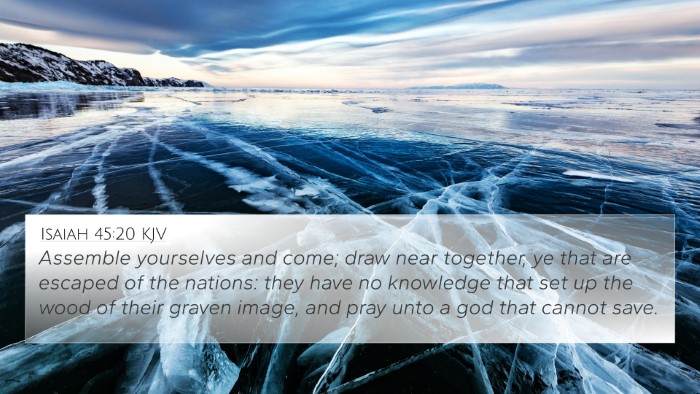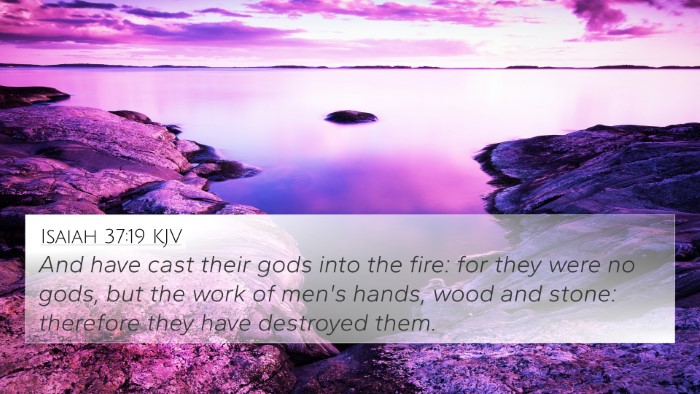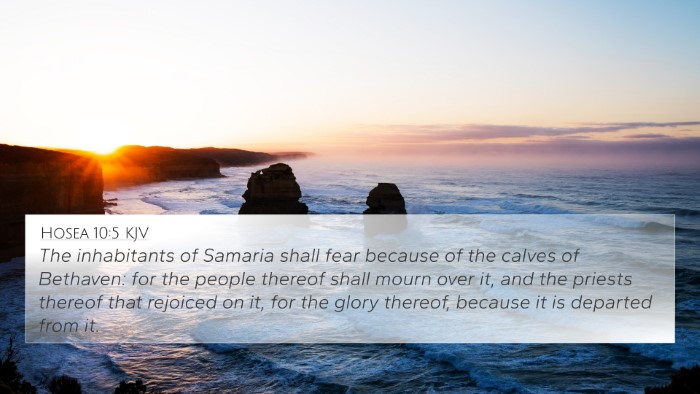Understanding Isaiah 46:2
Verse Reference: Isaiah 46:2 - "They stoop, they bow down together; they could not deliver the burden, but themselves are gone into captivity."
Summary of Meaning
The verse Isaiah 46:2 depicts the scene of false idols and their worshippers, emphasizing their powerlessness and inability to save themselves or deliver anyone from captivity. The context highlights the futility of relying on idols, contrasting the omnipotence of God with the impotence of these man-made entities.
Commentary Insights
Matthew Henry's Commentary
Matthew Henry emphasizes that the idols mentioned are just inanimate objects that require support from their worshippers. They cannot save themselves or their devotees, indicating the superficiality of idol worship. Henry points out that this verse serves as a warning against placing faith in anything other than God.
Albert Barnes' Commentary
Albert Barnes interprets this verse as a vivid illustration of the fallibility of idols. He asserts that these idols are depicted as stooping and bowing, which symbolizes their inability to respond to the needs and cries of their followers. Barnes underscores the idea that true deliverance comes solely from God, who does not falter or fall into captivity as idols do.
Adam Clarke's Commentary
Adam Clarke elaborates on the imagery in this verse, suggesting that the stooping of the idols signifies both their physical inability to assist and their metaphorical submission to the powers of Babylonian captivity. Clarke emphasizes that the futility of idol worship is a critical lesson for the people of God, advocating for reliance on the true and living God.
Cross References
Isaiah 46:2 relates to several other scripture passages that reinforce its themes:
- Jeremiah 10:5 - "They are upright like a palm tree, and they cannot speak; they must be carried because they cannot go by themselves. Do not be afraid of them, for they cannot do evil, nor is it in them to do good."
- Psalm 115:4-8 - "Their idols are silver and gold, the work of human hands. They have mouths, but do not speak; eyes, but do not see; they have ears, but do not hear; noses, but do not smell; they have hands, but do not feel; feet, but do not walk; and they do not make a sound in their throats. Those who make them become like them, so do all who trust in them."
- Isaiah 44:9-10 - "All who fashion idols are nothing, and the things they treasure are worthless; those who would speak for them are blind; they are all in darkness. Who shapes a god and casts an idol that is profitable for nothing?"
- Isaiah 45:20 - "Assemble yourselves and come; draw near together, you survivors of the nations! They have no knowledge who carry about their wooden idols, and keep on praying to a god that cannot save."
- Psalm 135:15-18 - "The idols of the nations are silver and gold, the work of human hands. They have mouths, but do not speak; they have eyes, but do not see; they have ears, but do not hear; nor is there any breath in their mouths. Those who make them become like them, so do all who trust in them."
- Habakkuk 2:18-19 - "What profit is the idol when its maker has carved it, or an image, a teacher of lies, that he who is made of trust in it?"
- 1 Corinthians 8:4 - "Therefore, as to the eating of food offered to idols, we know that 'an idol has no real existence,' and that there is no God but one."
Thematic Connections
Isaiah 46:2 is not only significant on its own but also provides profound thematic connections throughout the Scriptures.
- Powerlessness of Idols: The continuous admonition against idol worship resonates from the Old Testament to the New Testament, showcasing unity in the messages of faith.
- God as Deliverer: The contrast between idols and the Lord's ability to save is a recurring theme, evident in passages that declare God's sovereignty.
- Contrast Between Man-made and Divine: The differentiation between idols crafted by human hands and the living God is a pivotal discussion across many texts.
Practical Application
Understanding Isaiah 46:2 and its cross-references offers invaluable lessons for personal faith. Believers are encouraged to evaluate what they place their trust in and to recognize the authority and efficacy of God in their lives.
Using Cross-References Effectively
To enhance Bible study, utilize cross-reference tools for a deeper understanding of connections between Bible verses. Methods include:
- Bible Concordance: A comprehensive tool that lists words and phrases, allowing users to find scriptures related to specific topics.
- Bible Chain References: These systems link verses together based on thematic elements, leading readers through interconnected scriptures.
Conclusion
Isaiah 46:2 serves as a stark reminder of the futility of idolatry and the importance of placing trust only in the living God. By examining cross-references and considering the insights from various commentaries, believers can gain a holistic understanding of the scriptures and their interconnected themes.



